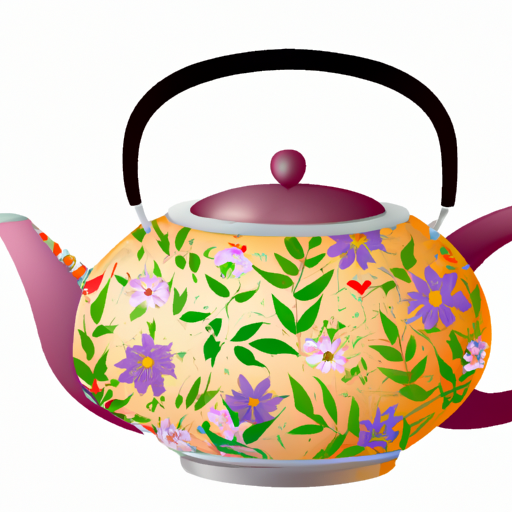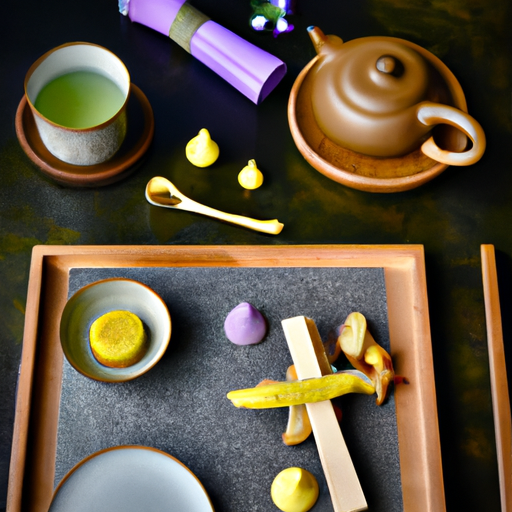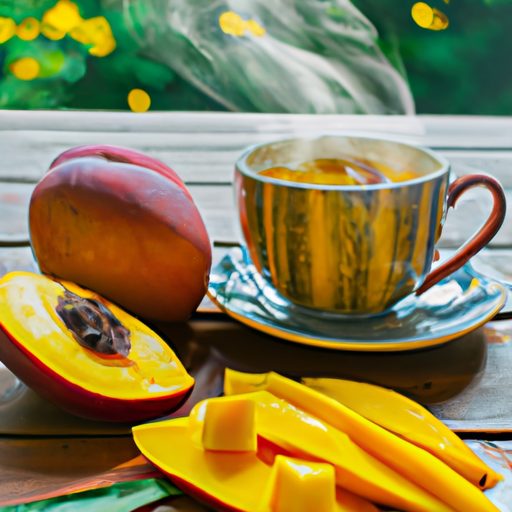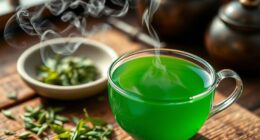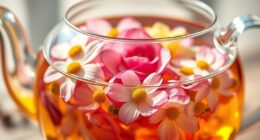As the sun sets and the world prepares for a restful night, a timeless bedtime secret has been shared through the ages. Sleep teas harness the soothing power of nature, offering a gentle lullaby to calm the mind and relax the body for a peaceful sleep.
These teas, infused with the magic of herbs and botanicals, offer a sanctuary of calm in a chaotic world.
Imagine sipping on a warm cup of chamomile, its delicate petals whispering sweet dreams into your ear. Or perhaps you prefer the earthy embrace of valerian root, a herbal remedy that has been used for centuries to lull insomnia to sleep. And let’s not forget the enchanting aroma of lavender essential oil, its floral notes dancing on the breeze as you drift off into slumber.
In this article, I will guide you through the realm of sleep teas, unveiling the seven best options for a better bedtime. From Art of Tea’s Sleep Tea to Celestial Seasonings’ Sleepytime Tea, each blend offers its own unique blend of herbs and flavors to create a truly restful experience.
So, put aside your worries and embrace the power of sleep teas as we embark on a journey to a better night’s sleep.
Key Takeaways
- Herbal teas such as chamomile and valerian root are known for their sleep-inducing properties.
- There are various ways to use herbs for better sleep, including infusing them in oil or steeping them as tea.
- Some popular sleep teas include Art of Tea’s Sleep Tea, Nitey Nite tea from Loose Leaf Tea Market, Pinky Up Tea’s Rest tea, and Lavender Moon Herbal Tea from Tielka Tea.
- Tips for better sleep include creating a restful environment, avoiding alcohol and technology before bed, and limiting caffeine intake.
Types of Sleep Teas
I’ve learned about the different types of sleep teas, such as chamomile and valerian root, that can help improve bedtime. These teas come in various flavors to suit different preferences.
Some sleep teas have a floral taste, while others have a minty or fruity flavor. It’s important to choose the right sleep tea for you based on your personal taste and the effects you’re looking for.
Chamomile tea, for example, is known for its calming properties and can help promote relaxation before bed. Valerian root tea is often used to alleviate insomnia and improve sleep quality.
When deciding on a sleep tea, consider the flavors that appeal to you and the specific benefits you’re seeking for a better bedtime experience.
Benefits and Uses
Are you aware of the various advantages and applications of herbal sleep teas? Incorporating sleep teas into your bedtime routine can have numerous benefits for a better night’s sleep.
Firstly, these teas contain herbs like chamomile and valerian root, which’ve been traditionally used for their calming and sedative properties. Drinking a cup of sleep tea before bed can help relax your mind and body, promoting a more restful sleep.
Secondly, incorporating sleep teas into your bedtime routine can create a calming ritual that signals to your body that it’s time to wind down and prepare for sleep.
Finally, it’s important to note that while herbal teas for sleep are generally safe, they may have potential side effects for certain individuals. It’s always a good idea to consult with a doctor before incorporating herbal teas into your sleep routine to ensure they’re safe for you.
Tips for Better Sleep
To improve the quality of your sleep, try creating a peaceful environment in your bedroom. Make sure your bedroom is cool, dark, and quiet.
Use blackout curtains or an eye mask to block out any light, and use earplugs or a white noise machine to drown out any noise.
Keep your bedroom clutter-free and organized to promote relaxation.
Avoid using technology before bed, as the blue light emitted from screens can disrupt your sleep cycle. Instead, engage in calming activities like reading a book or taking a warm bath.
By creating a restful environment and avoiding technology before bed, you can improve your sleep quality and wake up feeling refreshed in the morning.
Frequently Asked Questions
Are there any potential side effects of consuming sleep teas?
When it comes to potential side effects of sleep teas, it’s important to consider potential interactions with medications. While sleep teas are generally safe, it’s always best to consult with a doctor. In terms of effectiveness compared to other sleep aids, individual experiences may vary.
Can sleep teas help with conditions like insomnia or anxiety?
Sleep teas can potentially help with insomnia and anxiety. While the effectiveness may vary, some herbs like chamomile and valerian root have calming properties. However, it’s important to consult with a doctor for chronic conditions and consider pharmaceutical sleep aids as well.
How long should I steep sleep teas for maximum effectiveness?
To maximize the effectiveness of sleep teas, steeping time varies for different types. Chamomile and Valerian root teas should be steeped for 5-10 minutes. The best time to drink sleep teas is 30-60 minutes before bedtime for optimal results.
Can sleep teas be consumed by children or pregnant women?
Sleep teas should not be consumed by children or pregnant women due to potential safety concerns. However, there are natural alternatives such as creating a restful environment and practicing relaxation techniques that can promote sleep during pregnancy.
Are sleep teas addictive or habit-forming?
Sleep teas are not addictive or habit-forming. However, long term use may reduce their effectiveness. Alternatives to sleep teas include practicing good sleep hygiene, such as creating a relaxing bedtime routine and ensuring a comfortable sleep environment.


